
How To Make Natural Pesticides For Hot Pepper Plants
Even if you take great care, sometimes your pepper plants can fall victim to pests and other plights. In this case, you can turn to an arsenal of homemade, natural pesticides to rid your garden, and more specifically your chilli plants, of any pest insects or infections looking to do damage.
It's important to provide a consistent level of care and maintenance throughout the lifecycle of your hot pepper plants. Yet, even with regular upkeep, they can still fall victim to myriad issues, ranging from mould and disease to pest infestations. So it's best to keep an eye on your chilli plants and note any changes in their appearance or suspicious activity on them. But what should you do if your plants do become infested or infected?
Well, it's no secret that you can visit your local garden centre to purchase some pesticides, however, more often than not, these are made up of some pretty caustic chemicals that can potentially result in more harm than good for your plants. With that in mind, we're here to tell you how to make your own natural pesticides to protect your pepper plants.
Are natural pesticides better than synthetic?
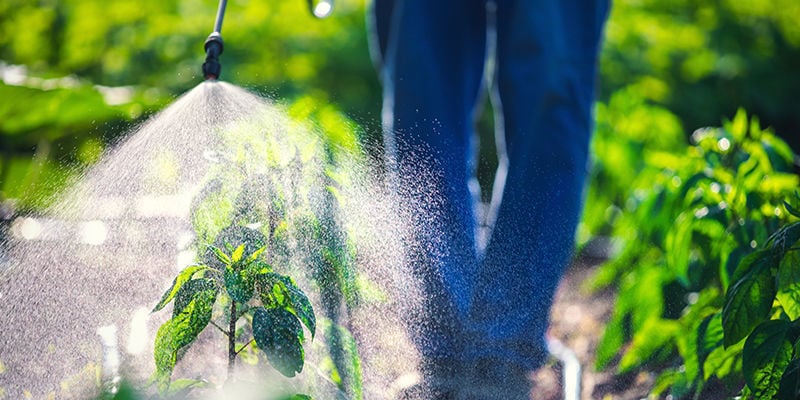
This is a hotly debated topic. A simple search online will give you plenty of polarising views, so we'll try to clear it up as best we can.
Typically, synthetic chemical pesticides are composed of high levels of chlorine, sulphur, nitrogen, and a host of other chemicals. While small amounts won't harm your plants, overuse will result in certain damage; leaves can wilt and take on an unhealthy burnt colour, and your chilli berries can suffer too. Lingering pesticide residue on peppers can also alter the taste. Not only that, but the use of synthetic pesticides can be devastating to the environment, albeit chiefly on a larger scale.
As a means to forego any harsh chemicals, many have taken to creating their own pesticides using natural ingredients. While they set out to provide your plants with the same level of care and prevention as synthetic pesticides, natural ones do so without the risk of tainting the chillis you've laboured over.
Arguably, the choice between synthetic and natural comes down to preference and the unique nature of your setup. It goes without saying that there are many ways to cultivate peppers at home, so do what's best for you.
Benefits of natural pesticides
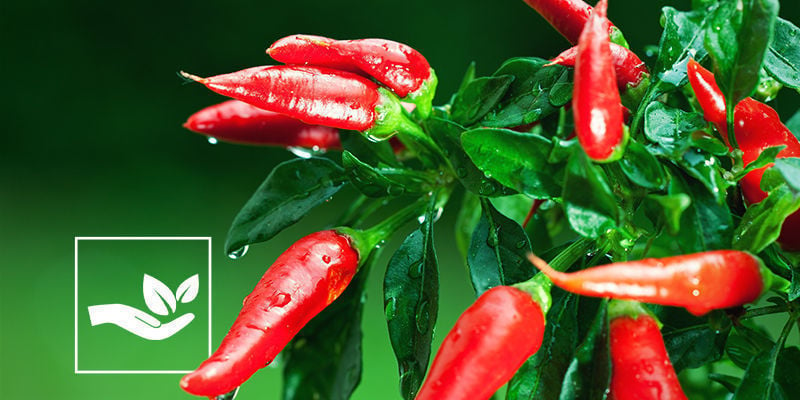
We've already touched upon a few of the benefits of using natural pest solutions for chilli pepper plants, but let’s break it down a little further.
✅ Healthier for your plants
As mentioned, the lack of abrasive and harsh chemicals means your plants aren't subject to any unnecessary damage. Instead, natural repellents harness ingredients that work with your plant.
✅ Work just as well as synthetic pesticides
You might be thinking that the secret to a successful pesticide is the harshness of the chemicals. Well, that's not true; by using some all-natural ingredients, it's entirely possible to create pesticides that will stave off any affliction.
✅ Provide a holistic gardening experience
Instead of purchasing from a shop, creating your own pesticides as and when needed will bolster your expertise and self-sufficiency as a grower. You’ll undoubtedly learn more about what your plants' needs and how to recognise any signs of struggle.
Natural pesticide recipes for chilli plants
If you're looking to create a natural insecticide or pesticide at home, we've got just what you need right here. While each recipe requires different ingredients, most can be found at home, or aren't too exotic to track down if need be.
Neem oil spray
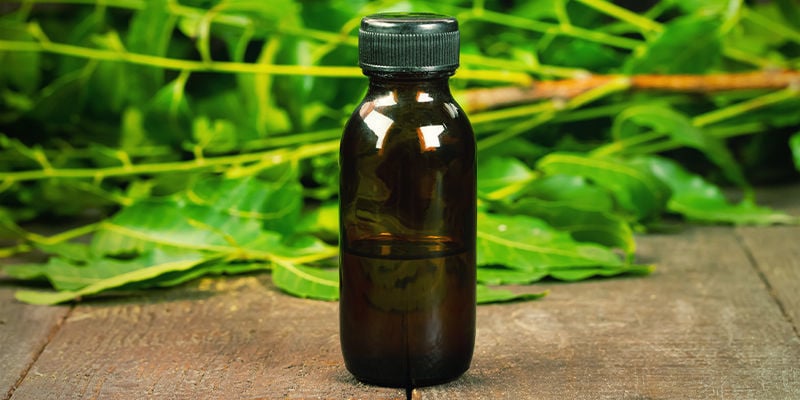
Known to deter and eliminate well over 200 species of insects, neem oil is a perfectly viable and versatile natural repellent. It's also straightforward to put together. While it can be purchased as a ready-made pesticide, we'll show you how to make your own with ease.
Ingredients
- 2 teaspoons high-quality cold-pressed neem oil
- 80ml dish soap (biodegradable)
- 900ml hot water
Hardware
Instructions
With so little required in the way of ingredients, all you need to do is pour the hot water into a spray bottle and add the dish soap. Now, add the neem oil, and seal the lid of the spray bottle. Once sealed, shake to mix the concoction thoroughly. Once mixed, it's ready for action. It really is as simple as that.
Garlic spray
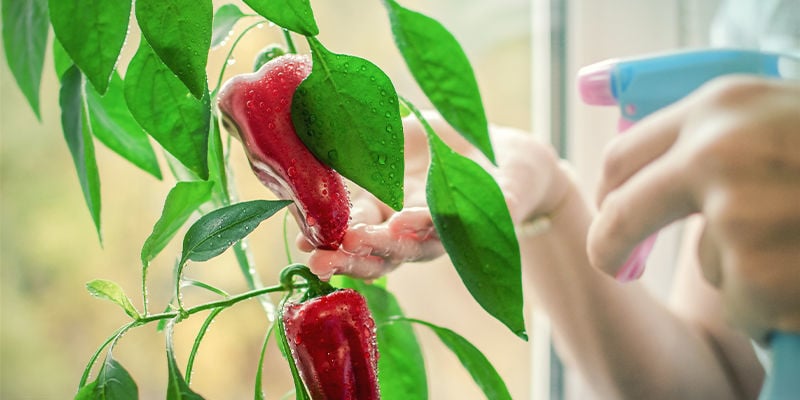
Using potent and aromatic ingredients such as garlic and onion on your chilli plants will be enough to repel and kill all sorts of garden pests. It's even been known to keep larger critters such as rats and mice away from plants. The use of garlic spray is an excellent all-natural solution for keeping your plants in tip-top condition throughout its growing cycle.
Ingredients
- ½ bulb garlic
- ½ onion
- 1 chilli
- 2 teaspoons dish soap (biodegradable)
- 2 tablespoons olive oil
- Hot sauce (optional)
Hardware
- Spray bottle
- Mason jar
- Food processor or blender
Instructions
This is a relatively easy recipe. The only additional piece of equipment required is a food processor or blender. Begin by placing the garlic, onion, chilli, and hot sauce inside the blender, and turn it on. Process until all the ingredients are reduced to a fine paste.
Now, take this paste and place it inside a mason jar filled with hot water. Leave it to sit at room temp for a few days (minimum of 24 hours). Once ready, strain the concoction through a fine sieve and pour it into a spray bottle until it's about half full. Lastly, add the olive oil and soap, shake to mix, and you've got your garlic spray ready to go.
Essential oil spray
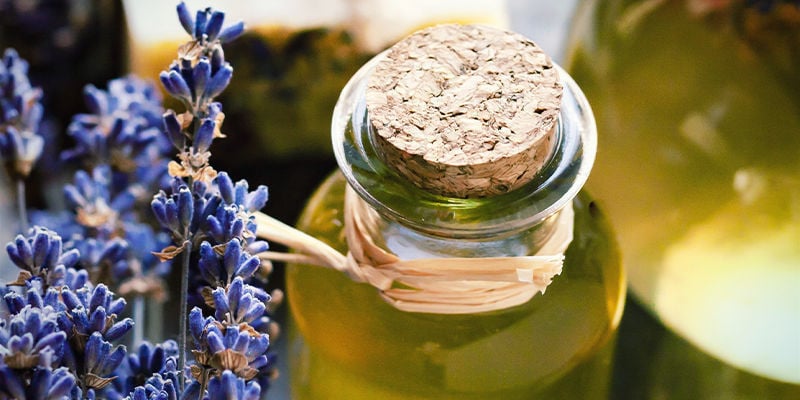
This one is really down to interpretation and what you’re looking to treat in the first place. When we say essential oil, we basically mean anything from peppermint to rosemary, and even lavender. Or, if you're feeling adventurous, try different combinations to see how they fare against various pests.
Ingredients
- 2 teaspoons dish soap (biodegradable)
- 80 drops of your chosen essential oils
- 220ml water
Hardware
- Spray bottle
Instructions
Simply combine all of your ingredients in a spray bottle, and give it a little shake before using. That’s it!
Just be sure to do your research on which essential oils to choose for each scenario, as they all cater for different types of insects or pests. So if there's one particular type that's giving you grief, whether that’s spider mites or fungal infections, counter it with the right essential oil(s).
How to use natural pesticides on chilli plants
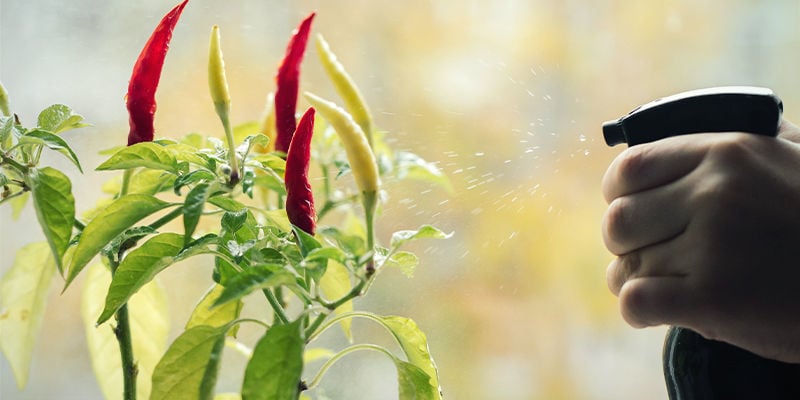
Now that you've got your chosen natural insecticide/pesticide all ready for use, how do you go about administering it? With a handy spray bottle, it's pretty effortless, but as with most things in life, it all comes down to timing.
Whichever natural repellent you've decided to make, begin by ensuring your plants' foliage is dry. Outdoors, you’ll want to administer your solution in the evening, as many insect pests are known to come out at night to feed.
Let’s say you’re dealing with a spider mite problem; put an end to their fun by spraying some neem oil solution liberally over the leaves, while strictly avoiding contact with the fruits themselves. Make sure to hit the underside of the leaves as well, as this is a location where bugs can congregate and lay eggs. Be sure to reapply every few days if you’re experiencing heavy rain.
Getting rid of plant pests naturally
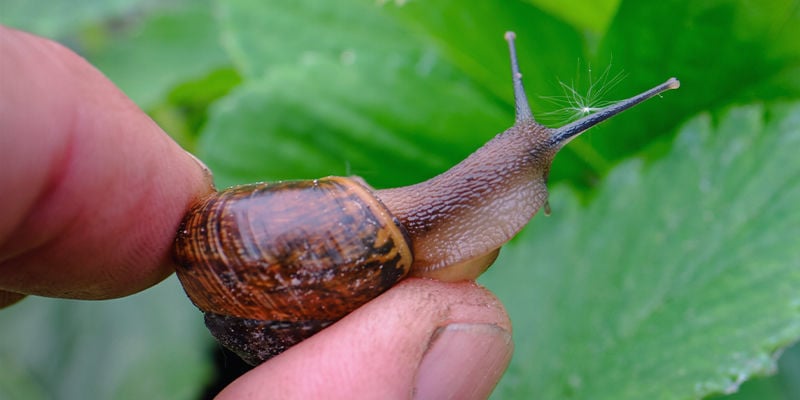
Of course, there are other natural methods you can use to eradicate or prevent pests. These include crop rotation, starting out with high-quality soil, using diatomaceous earth, and growing companion plants such as herbs to divert or repel the enemy. Not only that; you can actually use other, beneficial insects to hunt down and eradicate the pests doing harm to your chilli plants. These natural predators will happily feast on anything giving you trouble.
Don't forget about tried and tested methods like sticky traps, too, as these can help to prevent infestation and give you an idea of what's lurking in your grow. Also, if you happen to see just a few bugs on your plant, you can always remove these by hand as well. Please do Mother Nature and your plants a favour and refrain from using sticky traps outdoors, as they will catch and kill beneficial insects you actually want to attract for pollinating your chilli plants.
Though simple, these methods combined can make for a highly efficient anti-pest task force.
Be in control of your hot pepper plants
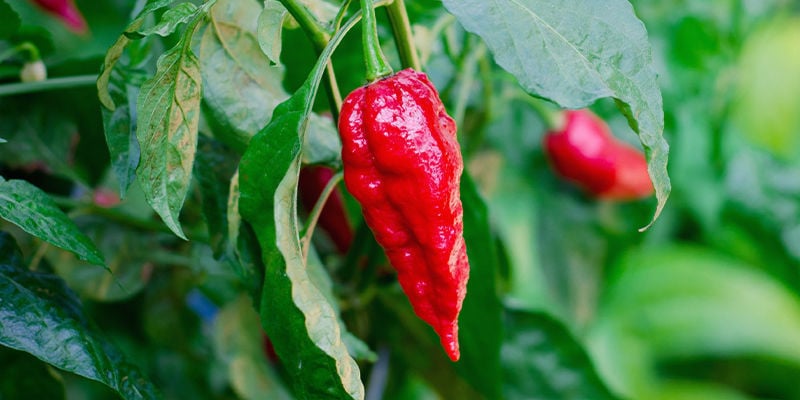
Giving your hot pepper plants sufficient care and attention is key to their overall health and the viability of their berries, not to mention essential in the fight against pests, pathogens, and diseases. So with that said, be sure to keep an eye on your plants, and you really can't go wrong.
By preventing a pest outbreak, you forgo pesticides altogether, whether natural or synthetic—and this is ultimately best for the environment and your plants. However, if you find yourself haunted/afflicted with an infestation, you now know how to combat it effectively and efficiently, so you'll be enjoying your bountiful harvest before you know it.
-
 8 min
18 March 2022
How To Grow Hot Peppers Outdoors
There's nothing quite like having your own supply of spicy hot peppers. And while it may seem a daunting task to grow them outdoors, we're here to show that it's really not! All you need to do is...
8 min
18 March 2022
How To Grow Hot Peppers Outdoors
There's nothing quite like having your own supply of spicy hot peppers. And while it may seem a daunting task to grow them outdoors, we're here to show that it's really not! All you need to do is...
-
 5 min
7 March 2022
How To Fertilise Hot Pepper Plants
There is a fine art to providing your plants with all the nutrients they need. Here's a breakdown of why and how to use fertiliser to maximise the potential of your pepper plants. Trust us; your...
5 min
7 March 2022
How To Fertilise Hot Pepper Plants
There is a fine art to providing your plants with all the nutrients they need. Here's a breakdown of why and how to use fertiliser to maximise the potential of your pepper plants. Trust us; your...
-
 7 min
4 March 2022
How To Grow Hot Peppers Indoors
Growing chillies might seem like a complicated task, but we're here to tell you that it really needn't be. Even if you don't have an adequate space outside to grow them, you can produce some...
7 min
4 March 2022
How To Grow Hot Peppers Indoors
Growing chillies might seem like a complicated task, but we're here to tell you that it really needn't be. Even if you don't have an adequate space outside to grow them, you can produce some...
-
 6 min
28 January 2022
The Most Common Chili Pepper Pests & Diseases
Cultivating chili pepper plants is not just about watering and feeding them; you must be prepared to tend to them when they're sick too! This guide will help you identify and treat the most common...
6 min
28 January 2022
The Most Common Chili Pepper Pests & Diseases
Cultivating chili pepper plants is not just about watering and feeding them; you must be prepared to tend to them when they're sick too! This guide will help you identify and treat the most common...













 United States
United States










